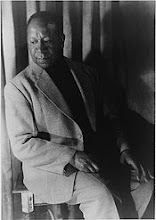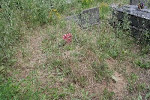Herb Gentry (1919-2003) was one of several African-American artists who moved to Paris after World War II. He was a friend of Beauford and speaks extensively of Beauford in the interview below.
The entire text of this posting is taken from the following source, which is in the public domain:
Oral history interview with Herbert Gentry, 1991 May 23, Archives of American Art, Smithsonian Institution. It has not been modified. The interview was conducted by Lisa Kirwin.
Herbert Gentry
© 1992 Walter Backen
Lomma, Sweden
Courtesy of Mary Anne Rose
MR. GENTRY: ...And then when I finally decided to go it was 1953. Beauford, I didn’t know him well. And then when I got on the boat I looked around to see who’s on the boat and -- did I tell you this? [Liza confirms] He was on the same boat and I spent all the time with him and it was a beautiful experience. This man was so philosophical. And then I guess he talked about things that we both never, you look at the sky – look at the blue and the clouds and we would talk about this and we would talk about feelings and thoughts and it was a beautiful time I spent those five or six days with him. And he had never been outside the States, but I had been to Paris.
Photo of a photo of Beauford on the deck of the ship Liberté
© Discover Paris!
And then we arrived at Le Havre and some people came to pick him up. I don’t know what happened, I went directly to -- I’ve forgot where I went but I was in Paris, I knew Paris. But I did ask him, I said, “Anything I can do for you?” He said, “No, I have friends who’re going to pick me up.” And then they picked him up and I went elsewhere.
And then eventually I saw him in Montparnasse. He became an artist in Montparnasse and everybody knew him in Montparnasse because he was a person that, he was a great artist. But the greatest philosopher I’ve ever met. He was older than most of the students, so he had all these wise sayings, and anybody had any psychological problem they would go and see him. Like for example, one time something was happening, I didn’t know, I went to see him. He said, “What’s the matter?” “Well,” I said, “the money’s low, I’m very unhappy and I don’t want to write home for money and I’ve money coming in.” And he would open a little purse he’d carried, he opened it and he said, “Look, I have enough for a little coffee and a croissant for -- oh yes, now tell me: what’s the matter?”
Sketch of Herb Gentry by Beauford Delaney
"Trying to make a wonder genius. With Glory!"
Courtesy of Mary Anne Rose and the Gentry Estate
And you know, I never really tell people all my problems. All of a sudden I caught myself: wow, great psychiatrist here, psychologist. And I’m talking to him and opening up and feeling better, I mean really. I realized -- well, I knew that later -- how important it is to have someone to talk to, have a dialogue, or have someone you can talk to and they would listen, maybe advise. And he would say these things. I felt good, you know! And that’s what he did to many people -- the French and everything, yes. He was a great artist, I would visit him from time to time.
And then later I met a painter named Larry Potter, an African-American painter, Larry Potter, a great friend of mine, who “passed” in Paris, who would eventually exhibit in New York, I’d have to write the forward to his exhibition. Both the Delaneys liked him very much and he was a very sensitive person. I remember we would walk to visit Beauford in his studio and in his studio everything was spick and span. And he’d have these big American white sheets all over everything. [Speaking in high falsetto] “-- with Beauford.” Everything was covered, this was part of his little illness become, I think. I mean hit a certain niveau [level] and after that you know you go right to the top in thinking and philosophy, philosophical statements. And then I think the mind can’t go any further. He was so great, in everything -- in painting, knowledge, warmth.
Larry Potter in Explorations of the City of Light Catalog
© Discover Paris!
Larry was very sensitive too. We would knock on his studio door and Larry would say, “Pardon me, open”. He said, “All right, if you’re not busy, can we come see you now?” That was very important to respect his privacy. He said, “Oh yes, you and Herbert Gentry, always.” Invariably we’d sit down and he’d fix us a little tea and he’d do his hands like this. [Liza laughs] We had a wonderful time. When he was in Montparnasse, the center, one of the cafes, Select Cafe, or the Dom, all the waiters, all the French people, Monsieur Beauford and he didn’t speak hardly any French but they all respected him. He was so kind. And it was the duty of all the artists in Montparnasse if they saw Beauford out there pretty late at night, they would take him home. He was a concern. He was very important to the American art life in Paris. And he was a great friend of James Baldwin [author], too, I guess you know that.
MS. KIRWIN: Yes, I was going to ask then you watched him progressively go – his mind?
MR. GENTRY: This is what happened. See, I was invited to exhibit in Denmark in 1959 when the Danish painters were invited to exhibit at the Riverside Museum. It was an honor, and they were the most famous Danish painters. But this museum does not exist any more, the Riverside Museum in New York; and I was invited to go to Denmark. So I went to Denmark and I had this exhibition and I stayed in Denmark for awhile, I worked there.
But I kept the studio in Paris, and I would go back from time to time; out of the year I was back to Paris every three or four months. What were we talking about?
MS. KIRWIN: I was asking about his health.
MR. GENTRY: Oh yes. So as soon as I’d go to Paris he would be one of the few that I’d know I had to see right away -- Larry Potter, my friend who had died, and Beauford Delaney and a number of friends but those two were the first two or three or four that I would go and see. So I would go and see him. Then I noticed that he started to get really away from me, he wasn’t very clear in what he was saying, he was going way up in the sky about what was happening, but it was [laughing] beautifully poetic. And I loved him. He would make statements like, “The sun is a sunny red.” He was right. [Laughter.] And you go with him and then you say, hey, you know, but maybe he’s a little off, but he was so great.
So he was very happy when I would come and give him a hug and we would talk and I’d find out if he had any money. I always would have a little money and I’d take him to dinner. And one time Romare Bearden came and spent about two weeks in Paris and he and Annette, his wife, widow. First he would ask for Beauford and then we took him down to an American restaurant, [belonging to] a fellow named Haynes [Leroy “Roughhouse” Haynes]. You never heard of him?
Portrait of Leroy Haynes
Photo © 2005 Discover Paris!
An American restaurant in Montmartre and we went there. Soon as he finished – “Beauford was hungry, he ate so well,” but all of a sudden right after he finished wanted to go right back to Montparnasse, that was his home area, see he knew that. Then I knew that he was getting old, because he got nervous, but while he was eating he was hungry -- maybe hadn’t eaten that day. Not because he didn’t have money but this sickness was starting.
Haynes Restaurant
(Closed in 2009)
© 2005 Discover Paris!
And then I heard someone say that he gave some of his paintings away. I went and found that person, I got those paintings back. But then he started giving some paintings away. Some people might have taken advantage of him, took his paintings.
End of excerpt















